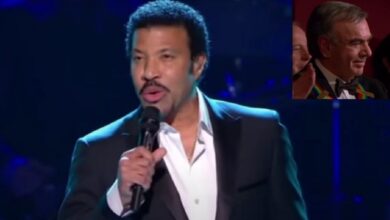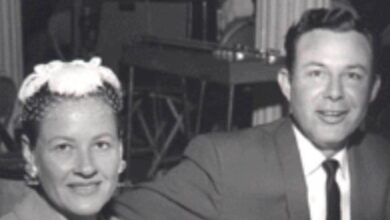Listening to Marty Haggard’s son sing his father’s song brings tears to our eyes
“Mama’s Hungry Eyes” is a profoundly emotional country song that was penned and performed by Merle Haggard in 1968. This track serves as a heartfelt homage to Haggard’s mother, showcasing the numerous hardships and sacrifices she faced while nurturing her children on her own following her husband’s death. The original lyrics illustrate the challenges a mother endured, providing for her family with steadfast love and unwavering strength, despite her own struggles.
Merle Haggard’s performance of “Mama’s Hungry Eyes” beautifully conveys the essence of his mother’s sacrifices through its vivid storytelling and emotional richness. The poignant narrative resonates with many, echoing themes of familial loyalty and the deep respect Haggard held for his mother. The song’s simple yet impactful melody complements its touching lyrics, making it a timeless classic within the annals of country music.
In homage to his father’s legacy, Marty Haggard, Merle’s son, recorded his own interpretation of “Mama’s Hungry Eyes” years later. This version builds upon the original by adding new lyrics and offering a fresh perspective. Marty’s adaptation introduces a new verse that sheds light on the challenges faced by Merle’s mother, emphasizing her determination to support her family even while juggling multiple jobs. This verse depicts her working at a truck stop, washing dishes, and regardless of her exhaustion, she always found the strength to sing to her children, providing them with a sense of home and reassurance.
Marty Haggard’s rendition retains the emotional heart of the original while infusing his own vocal style and interpretation. His version pays tribute to his father’s legacy while bringing new life to the song, celebrating his mother’s story through his unique musical perspective. This adaptation illustrates Marty’s respect for his father’s influence and his own appreciation for the narrative woven into the song.
The significance of “Mama’s Hungry Eyes” transcends its lyrics, resonating deeply with an audience that finds comfort in its themes of family loyalty and perseverance. Its lasting appeal is rooted in its honest depiction of struggle and love—universal elements that continue to resonate with listeners.
The legacy of “Mama’s Hungry Eyes” underscores the power of storytelling within country music. It encapsulates the raw emotionality of a personal experience while reflecting broader themes of sacrifice and resilience. Both Merle Haggard’s original and Marty Haggard’s adaptation contribute to the song’s enduring impact, emphasizing the essence of family and the significance of personal narratives in the rich tapestry of country music.





